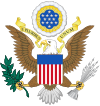| Revision as of 21:51, 23 August 2008 view sourceMark Shaw (talk | contribs)Extended confirmed users, Pending changes reviewers4,727 edits rv unexplained deletion← Previous edit | Revision as of 17:35, 25 August 2008 view source 8.7.69.227 (talk) →ColoniesNext edit → | ||
| Line 22: | Line 22: | ||
| ** ], later ] and ] | ** ], later ] and ] | ||
| ** ], later ] | ** ], later ] | ||
| ** ], later ] | |||
| ==Other divisions prior to 1730== | ==Other divisions prior to 1730== | ||
Revision as of 17:35, 25 August 2008
| This article includes a list of references, related reading, or external links, but its sources remain unclear because it lacks inline citations. Please help improve this article by introducing more precise citations. (Learn how and when to remove this message) |
| This article is part of a series on the | ||||||||||||||||||||||||||||||||||||||||||||||||||||||||||||||||||||
| History of the United States | ||||||||||||||||||||||||||||||||||||||||||||||||||||||||||||||||||||
|---|---|---|---|---|---|---|---|---|---|---|---|---|---|---|---|---|---|---|---|---|---|---|---|---|---|---|---|---|---|---|---|---|---|---|---|---|---|---|---|---|---|---|---|---|---|---|---|---|---|---|---|---|---|---|---|---|---|---|---|---|---|---|---|---|---|---|---|---|
 | ||||||||||||||||||||||||||||||||||||||||||||||||||||||||||||||||||||
Timeline and periods
|
||||||||||||||||||||||||||||||||||||||||||||||||||||||||||||||||||||
| Topics | ||||||||||||||||||||||||||||||||||||||||||||||||||||||||||||||||||||
| Groups | ||||||||||||||||||||||||||||||||||||||||||||||||||||||||||||||||||||
Places
|
||||||||||||||||||||||||||||||||||||||||||||||||||||||||||||||||||||

The Thirteen Colonies were part of what became known as British America, a name that was used by Great Britain until the Treaty of Paris (1783) recognized the independence of the original United States of America. These thirteen British colonies in North America rebelled against British rule in 1775. A provisional government was formed which proclaimed their independence, which is now celebrated as having occurred on July 4, 1776, and subsequently became the original thirteen United States of America. The colonies were founded between 1607 (Virginia), and 1733 (Georgia), although Great Britain held several other colonies in North America and the West Indies.
Colonies
Contemporaneous documents usually list the thirteen revolutionary colonies of British North America in geographical order, from north to south.
- New England
- Middle Colonies
- Province of New York, later named to New York and Vermont
- Province of New Jersey, later New Jersey
- Province of Pennsylvania, later Pennsylvania
- Delaware Colony (before 1776, the Lower Counties on Delaware), later Delaware
- Southern Colonies (depending on the subject under discussion, Virginia and Maryland may be grouped as the Chesapeake Colonies)
- Province of Maryland, later Maryland
- Colony and Dominion of Virginia, later Virginia, Kentucky and West Virginia
- Province of North Carolina, later North Carolina and Tennessee
- Province of South Carolina, later South Carolina
Other divisions prior to 1730
- Dominion of New England
- Created by King James II with the consolidation of Maine, New Hampshire, Massachusetts Bay Colony, Plymouth Colony, Rhode Island, Connecticut, Province of New York, East Jersey, and West Jersey into a single larger colony in 1685. The experiment was discontinued with the Glorious Revolution of 1688-89, and the nine former colonies re-established their separate identities in 1689.
- Province of Maine
- Settled in 1622 (An earlier attempt to settle the Popham Colony on Sagadahoc Island, Maine in 1607 was abandoned after only one year). Massachusetts Bay colony encroached into Maine during the English Civil War, but, with the Restoration, autonomy was returned to Maine in 1664. Maine was officially merged into Massachusetts Bay Colony with the issuance of the Massachusetts Bay charter of 1691.
- Plymouth Colony
- Settled in 1620 by the Pilgrims. Plymouth was absorbed by Massachusetts Bay Colony with the issuance of the Massachusetts Bay charter of 1691.

- New Haven
- Settled in late 1637. New Haven was absorbed by Connecticut Colony with the issuance of the Connecticut Charter in 1662, partly as royal punishment by King Charles II for harboring the regicide judges who sentenced King Charles I to death.
- East and West Jersey
- New Jersey was divided into two separate colonies in 1674. The Jerseys were reunited in 1702.
- Province of Carolina
- Founded in 1663. Carolina colony was divided into North Carolina and South Carolina in 1712. Both colonies became royal colonies in 1729.
Population
(Note: the population figures do not account for the native tribes who originally resided there.)

| Year | Population |
|---|---|
| 1625 | 1,980 |
| 1641 | 50,000 |
| 1688 | 200,000 |
| 1702 | 270,000 |
| 1715 | 434,600 |
| 1749 | 1,046,000 |
| 1754 | 1,485,634 |
| 1765 | 2,240,000 |
| 1775 | 2,418,000 |
See also
- British North America
- Colonial America
- Colonial government in America
- History of the United States (1776-1789): Independence and the American Revolution
- American Revolution
- History of the United States
- British colonization of the Americas
Notes
- The present State of Vermont was disputed between the colonies of New York and New Hampshire. From 1777 to 1791, it existed as the de facto independent Vermont Republic.
- Greene
References
- Cooke, Jacob Ernest et al., ed. Encyclopedia of the North American Colonies. Scribner's, 1993. 3 vol; 2397 pp.
- Gipson, Lawrence. The British Empire Before the American Revolution (15 volumes) (1936-1970), Pulitzer Prize; highly detailed discussion of every British colony in the New World
- Greene, Evarts Boutelle et al., American Population before the Federal Census of 1790, 1993, ISBN 0806313773
- Greene, Evarts Boutelle. Provincial America, 1690-1740. 1905. online
- Osgood, Herbert L. The American Colonies in the Seventeenth Century. 4 vol Columbia University Press, 1904-07. online
- Vickers, Daniel, ed. A Companion to Colonial America. Blackwell, 2003. 576 pp.
